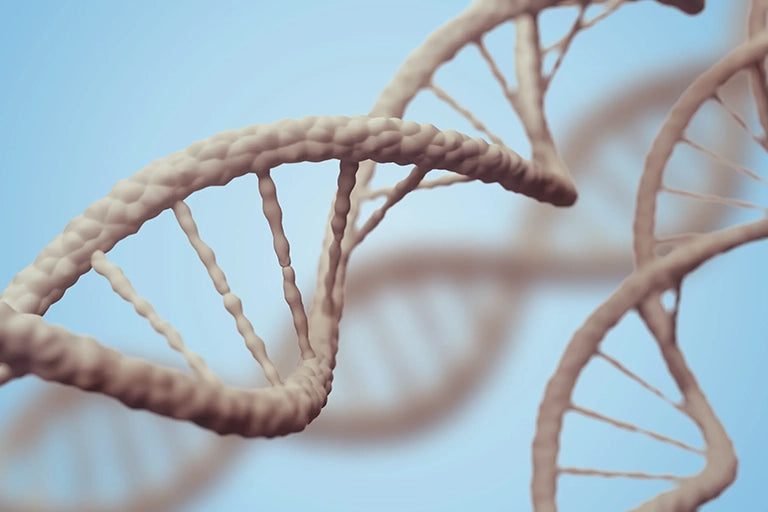Nucleotides and the gut
The most important facts at a glance
What are nucleotides?
Read a short definition about nucleotides and their importance in DNA and RNA.
Learn moreThe link between nucleotides and gut health
Have you always wondered how nucleotides affect your gut health? Find out how they contribute to the regeneration of intestinal cells, the strengthening of the immune system and the promotion of good bacteria in the gut.
Learn moreThe gut plays a crucial role in our health and well-being. A healthy intestinal flora is essential for good digestion and a strong immune system. Nucleotides, the building blocks of DNA and RNA, are an important component of intestinal health. They play an important role in the regeneration of intestinal cells, the strengthening of the immune system and the promotion of good bacteria in the gut. In this article, we explore the link between nucleotides and gut health.
What are nucleotides?
Nucleotides are the building blocks of DNA and RNA, the two most important molecules for storing and transmitting genetic information. They consist of three main components: a sugar, a phosphate and a base. The sugar is either deoxyribose (in DNA) or ribose (in RNA). The phosphate group is used to link the nucleotides into long chains, while the base carries the genetic information. There are four different bases: Adenine (A), Thymine (T), Cytosine (C) and Guanine (G). The arrangement of these bases in DNA is crucial for genetic coding and the transmission of genetic information. Nucleotides are linked together by phosphodiester bonds. These bonds are formed by the loss of a water molecule between the phosphate group of one nucleotide and the sugar of the next nucleotide. These links form the so-called nucleotide sequence, which contains the genetic code in the DNA and RNA.

Vegan supplements for gut health that contain nucleotides
The link between nucleotides and gut health
Nucleotides have a direct influence on intestinal health. They play an important role in the regulation of the immune system and the function of the intestine. They also promote the growth of beneficial gut bacteria and can reduce inflammation in the gut. A balanced intake of nucleotides can help maintain a healthy intestinal flora and prevent intestinal disorders.
Regeneration of the intestinal cells
As already mentioned, nucleotides are the building blocks of DNA and RNA, the genetic information in cells. During the regeneration of intestinal cells, this genetic information is required for cell division. During cell division, the genetic information in the cells is duplicated and each new cell receives a complete copy of the DNA. Around 3 billion nucleotides are required for a single cell division. Nucleotides play a crucial role as they provide the energy required for this process. Intestinal cells divide continuously to renew the surface of the intestine and replace worn-out cells. This process is supported by the presence of sufficient amounts of nucleotides. Studies have shown that an adequate supply of nucleotides increases the number of cell divisions and improves the regeneration rate of intestinal cells. This means that the cells can be renewed faster and more efficiently, which keeps the intestines healthy and functional. They also have an anti-inflammatory effect and support the formation of mucous membranes in the intestine, which act as a protective barrier. Tissues and organs in particular have a high demand for nucleotides during regeneration. A lack of nucleotides can therefore impair the regeneration of intestinal cells and lead to weakened intestinal health. For this reason, it is important to eat a balanced and nutritious diet that contains sufficient nucleotides to promote the regeneration of intestinal cells.
Strengthening the immune system
Nucleotides can also help to strengthen the immune system. Studies have shown that nucleotides have anti-inflammatory properties and can promote the production of so-called cytokines, which are important for the immune response. They can also help improve intestinal permeability and promote the growth of healthy gut bacteria. By supporting healthy bacterial flora, the absorption of nutrients is improved and digestion is facilitated. In turn, a healthy gut is crucial for the immune system, as around 70% of immune cells are located in the gut. In addition, nucleotides increase the production of antibodies and white blood cells, which helps to ward off infections and diseases. Nucleotides can also be used in certain conditions to boost the immune system and improve gut health. For example, in children with diarrhea. Nucleotides can be used to reduce the duration and severity of symptoms. Nucleotides can also help to reduce inflammation and improve intestinal health in inflammatory bowel diseases such as Crohn's disease and ulcerative colitis. Taking nucleotides can therefore help to prevent infections and inflammation in the gut and also strengthen the immune system.
Promotion of good bacteria in the gut
There are numerous bacteria in the gut that are responsible for the digestion and absorption of nutrients. An imbalance in the intestinal flora can lead to various health problems such as diarrhea, constipation or flatulence. It can also increase the risk of infections. Recent studies have shown that nucleotides promote the growth and activity of certain beneficial bacteria in the intestine (bifidobacteria) and thus keep the intestinal flora in balance. In short, they help them to multiply. Nucleotides can also help to improve intestinal permeability, which means that the intestinal wall becomes more impermeable to harmful bacteria and toxins. This can help to reduce inflammation in the gut and reduce the risk of gut problems such as irritable bowel syndrome and inflammatory bowel disease. One way to absorb nucleotides is through diet. Foods such as meat, fish and pulses are rich in nucleotides. However, food supplements containing nucleotides can also help to support healthy intestinal flora.
"Since I have been taking 2 capsules in the morning and a protein shake during the day, my well-being has really changed for the better. I hardly have any more problems with my irritable bowel syndrome, my hay fever is no longer noticeable and I have experienced an incredible increase in energy. I can really only recommend the products!"
Our conclusion
The human body needs a certain amount of nucleotides to be fully functional. They play a particularly important role in the intestine. Without nucleotides, the protective barrier in the intestine can be damaged and the regeneration of intestinal cells can be hindered. This weakens intestinal health. A weakened gut can in turn have a negative effect on the immune system, as over half of all immune cells are located in the gut. In addition, nucleotides promote the growth of healthy intestinal bacteria that keep the intestinal flora in balance. Therefore, the body's need for nucleotides should always be covered. They can be obtained through dietary supplements or food.




